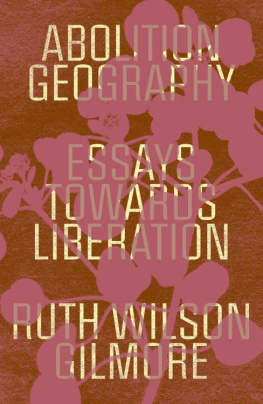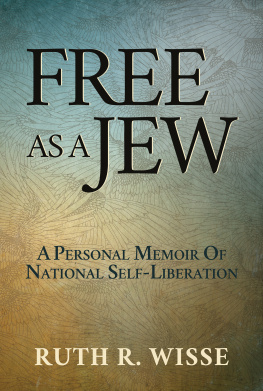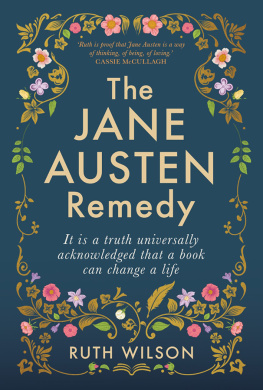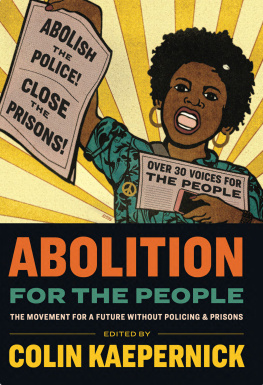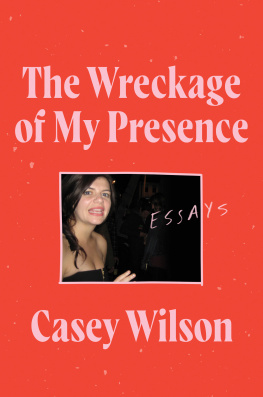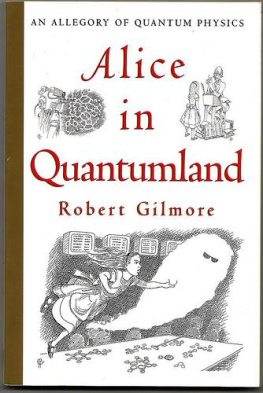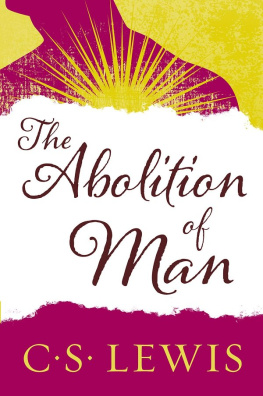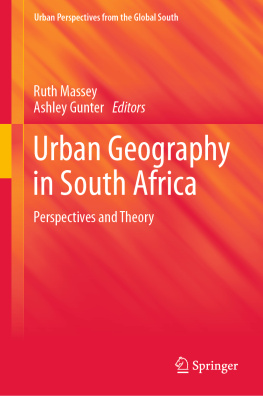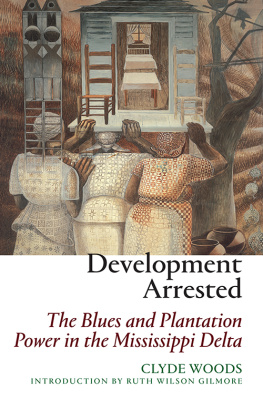Ruth Wilson Gilmore - Abolition Geography: Essays Towards Liberation
Here you can read online Ruth Wilson Gilmore - Abolition Geography: Essays Towards Liberation full text of the book (entire story) in english for free. Download pdf and epub, get meaning, cover and reviews about this ebook. year: 2022, publisher: Verso, genre: Politics. Description of the work, (preface) as well as reviews are available. Best literature library LitArk.com created for fans of good reading and offers a wide selection of genres:
Romance novel
Science fiction
Adventure
Detective
Science
History
Home and family
Prose
Art
Politics
Computer
Non-fiction
Religion
Business
Children
Humor
Choose a favorite category and find really read worthwhile books. Enjoy immersion in the world of imagination, feel the emotions of the characters or learn something new for yourself, make an fascinating discovery.
- Book:Abolition Geography: Essays Towards Liberation
- Author:
- Publisher:Verso
- Genre:
- Year:2022
- Rating:5 / 5
- Favourites:Add to favourites
- Your mark:
- 100
- 1
- 2
- 3
- 4
- 5
Abolition Geography: Essays Towards Liberation: summary, description and annotation
We offer to read an annotation, description, summary or preface (depends on what the author of the book "Abolition Geography: Essays Towards Liberation" wrote himself). If you haven't found the necessary information about the book — write in the comments, we will try to find it.
Abolition Geography: Essays Towards Liberation — read online for free the complete book (whole text) full work
Below is the text of the book, divided by pages. System saving the place of the last page read, allows you to conveniently read the book "Abolition Geography: Essays Towards Liberation" online for free, without having to search again every time where you left off. Put a bookmark, and you can go to the page where you finished reading at any time.
Font size:
Interval:
Bookmark:
Abolition Geography
Essays Towards Liberation
Ruth Wilson Gilmore
Edited by
Brenna Bhandar
and
Alberto Toscano

For all of the teachers
First published by Verso 2022
Ruth Wilson Gilmore 2022
All rights reserved
The moral rights of the authors have been asserted
1 3 5 7 9 10 8 6 4 2
Verso
UK: 6 Meard Street, London W1F 0EG
US: 388 Atlantic Avenue, Brooklyn, NY 11217
versobooks.com
Verso is the imprint of New Left Books
ISBN-13: 978-1-83976-170-6
ISBN-13: 978-1-83976-173-7 (US EBK)
ISBN-13: 978-1-83976-172-0 (UK EBK)
British Library Cataloguing in Publication Data
A catalogue record for this book is available from the British Library
Library of Congress Cataloging-in-Publication Data
A catalog record for this book is available from the Library of Congress
Printed and bound by CPI Group (UK) Ltd, Croydon, CR0 4YY
Contents
Original Sources
(in order of publication)
Decorative Beasts: Dogging the Academy in the Late 20th Century. California Sociologist 14 (12) (1991): 113135.
Public Enemies and Private Intellectuals: Apartheid USA Race and Class 35 (1) (1993): 6578.
Terror Austerity Gender Excess Theater. In Robert Gooding-Williams (ed.) Reading Rodney King/Reading Urban Uprising New York and London: Routledge, 1993.
Globalisation and U.S. Prison Growth: From Military Keynesianism to Post-Keynesian Militarism. Race and Class 40 (23) (1998): 17187.
You Have Dislodged a Boulder. Transforming Anthropology 8 (1&2) (1999): 1238.
Race and Globalization. In R. J. Johnston, Peter J. Taylor and Michael J. Watts (eds), Geographies of Global Change: Remapping the World, 2nd ed., Oxford: Blackwell, 2002, 261274.
Fatal Couplings of Power and Difference: Notes on Racism and Geography. The Professional Geographer 54 (2002): 1524.
(with Craig Gilmore) The Other California, in David Solnit (ed., Globalize Liberation: How to Uproot the System and Build a Better World, San Francisco: City Lights, 2003.
Scholar-Activists in the Mix. Progress in Human Geography 29 (2) (2005): 17782.
From Military-Industrial Complex to Prison-Industrial Complex: An Interview with Ruth Wilson Gilmore. (Interview with Trevor Paglen), Recording Carceral Landscapes (2005).
In the Shadow of the Shadow State. In The Revolution Will Not Be Funded, edited by Incite! Women of Color against Violence, Cambridge, MA: South End Press, 2007.
Forgotten Places and the Seeds of Grassroots Planning. in Engaging Contradictions: Theory, Politics, and Methods of Activist Scholarship, In Charles R. Hale (ed.) University of California Press, 2008, 3161.
(with Craig Gilmore) Restating the Obvious, in Michael Sorkin (ed.), Indefensible Space: The Architecture of the National Insecurity State, London: Routledge, 2008.
Race, Prisons and War: Scenes from the History of US Violence, Socialist Register 2009: Violence Today, London: Merlin, 2009.
What is To Be Done? American Quarterly 63.2 (2011): 245265.
Race, Capitalist Crisis, and Abolitionist Organizing (interview with Jenna Loyd), in Jenna M. Loyd, Matt Michelson, and Andrew Burridge (eds), Beyond Walls and Cages: Prisons, Borders, and Global Crisis, Athens, GA: The University of Georgia Press, 2012.
The Worrying State of the Anti-Prison Movement, Social Justice: A Journal of Crime, Conflict & World Order. Available at: http://www.socialjusticejournal.org/the-worrying-state-of-the-anti-prison-movement/ (2015).
(with Craig Gilmore) Beyond Bratton, in Jordan T. Camp and Christina Heatherton (eds), Policing the Planet, London: Verso, 2016).
Abolition Geography and the Problem of Innocence, in Gaye Theresa Johnson and Alex Lubin (eds), The Futures of Black Radicalism, London: Verso, 2017.
Prisons and Class Warfare (interview with Clment Petitjean/Priode), http://www.historicalmaterialism.org/index.php/interviews/prisons-and-class-warfare (2018).
Editors Introduction:
Reports from Occupied Territory
Brenna Bhandar and Alberto Toscano
The meek shall inherit the earth, it is said. This presents a very bleak image to those who live in occupied territory.
James Baldwin, A Report from Occupied Territory
As with the twentieth, the problem of the twenty-first century is freedom; and racialized lines continue powerfully, although non-exclusively, to define freedoms contours and limits.
Ruth Wilson Gilmore, Race and Globalization
In his unfinished essay A Philosophical View of Reform, penned in the wake of the Peterloo Massacre, the poet Percy Bysshe Shelley spoke of the solemnly recorded maxims of liberation as trophies of our difficult and incomplete victory, planted on our enemies land. This aptly geographical image can certainly be applied to the current fate of abolitionism. The past few years have witnessed an apparent erosion of the ideological defenses that prevented the very idea of abolishing prisons and police from being seen as anything more than a utopian distraction from the urgent demands of political pragmatism. Mass movements catalyzed by intolerable acts of state violence have helped to crack open the space of the sayable and the imaginable, allowing the fruits of decades of grassroots organizing and discursive struggle to gain a certain (at times distorted) visibility. In gathering three decades worth of Ruth As we hope briefly to sketch, it is in their powerful and distinctive recasting of the oppositional dialectic between practices of freedom and the ravages of racial capitalism that these texts help to set some of the most vital of contemporary debates on different tracks. If ideology is the falsely transparent domain of the taken-for-granted, then these essays towards liberation also double as incisive interventions in ideology critique, breaking our facile associations between neoliberal globalization and anti-statism, dismantling our identification of abolition with mere decarceration, and showing the poverty of any understanding of racialization and anti-racism that evades their uneven planetary dynamics and plural if interconnected histories.
To theorize is, among other things, to try to see differently, to forge imaginaries and representations that have the potential for collective appropriation and use. A telling index of Gilmores own way of seeing, of her own style of cognitive mapping, comes in her reflection on the debilitating restriction in the scope of a term that has been closely associated to the politics of abolition, namely the prison-industrial complex. As Gilmore observes,
This conceptually expansive understanding of the PIC, there as a lure for the kind of thinking and practice that follow the circuits and mediations of carceral power into spaces and institutions that might seem to have little to do with the prison, is juxtaposed to a rigid, restrictive use whose consequence is to shrivelatrophy, reallyrather than to spread out imaginative understanding of the systems apparently boundless boundary-making. The experimental expansion of our political imagination is also evidenced in the way that Gilmore articulates the centering of the prison in abolition geography. Elsewhere, she enjoins us temporarily to put aside a conception of contemporary geographic transformations in terms of the globalization of capital flows and its effects and to think instead of the nexus between racialization, criminalization, class, and state-building. This methodological and analytical proposal is advanced as a kind of cartographic gestalt switch, as the call
Next pageFont size:
Interval:
Bookmark:
Similar books «Abolition Geography: Essays Towards Liberation»
Look at similar books to Abolition Geography: Essays Towards Liberation. We have selected literature similar in name and meaning in the hope of providing readers with more options to find new, interesting, not yet read works.
Discussion, reviews of the book Abolition Geography: Essays Towards Liberation and just readers' own opinions. Leave your comments, write what you think about the work, its meaning or the main characters. Specify what exactly you liked and what you didn't like, and why you think so.

